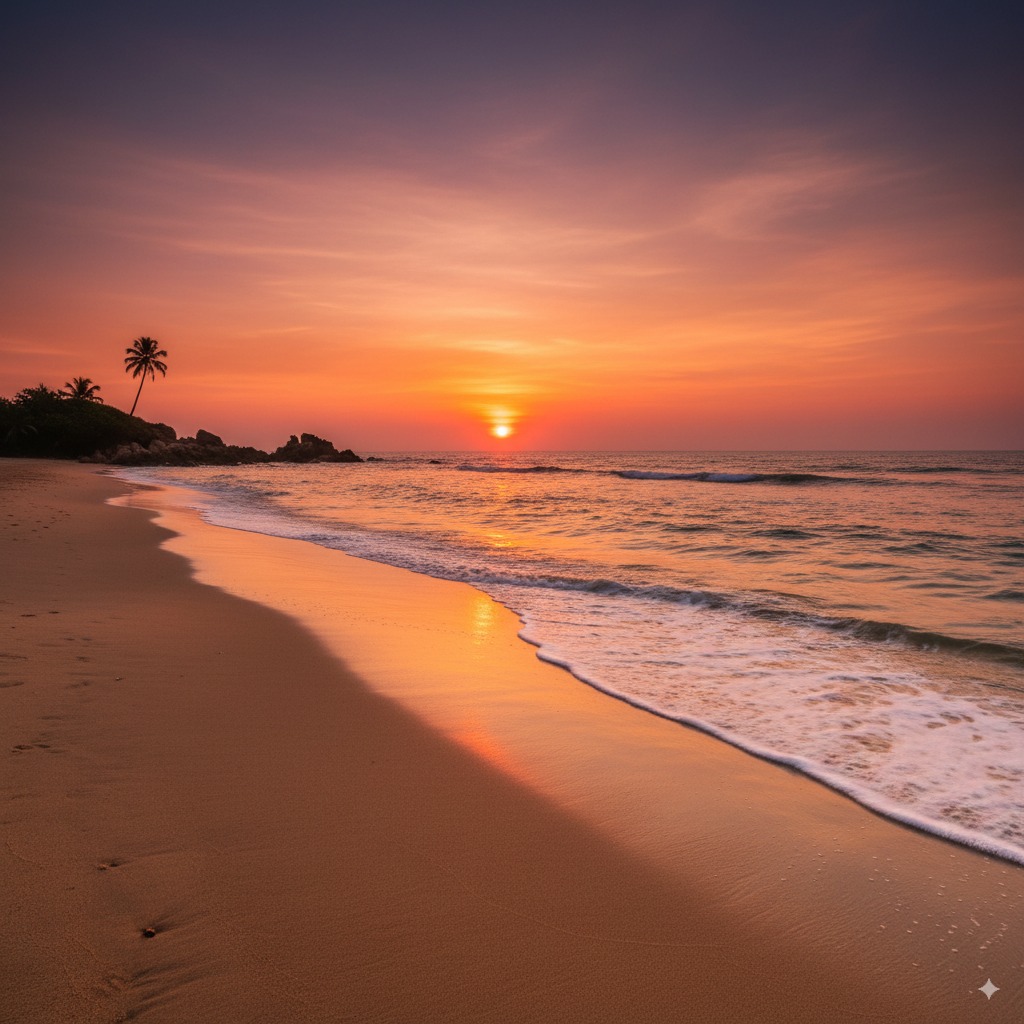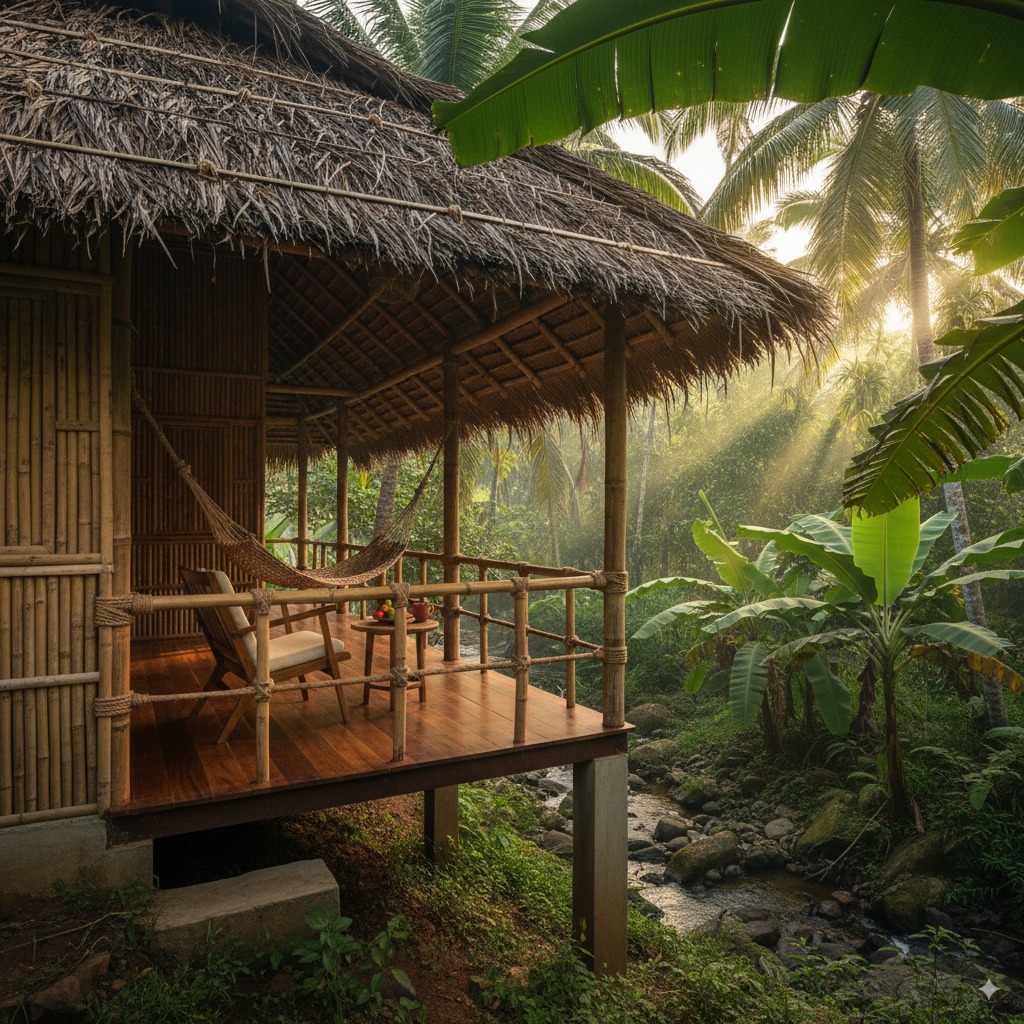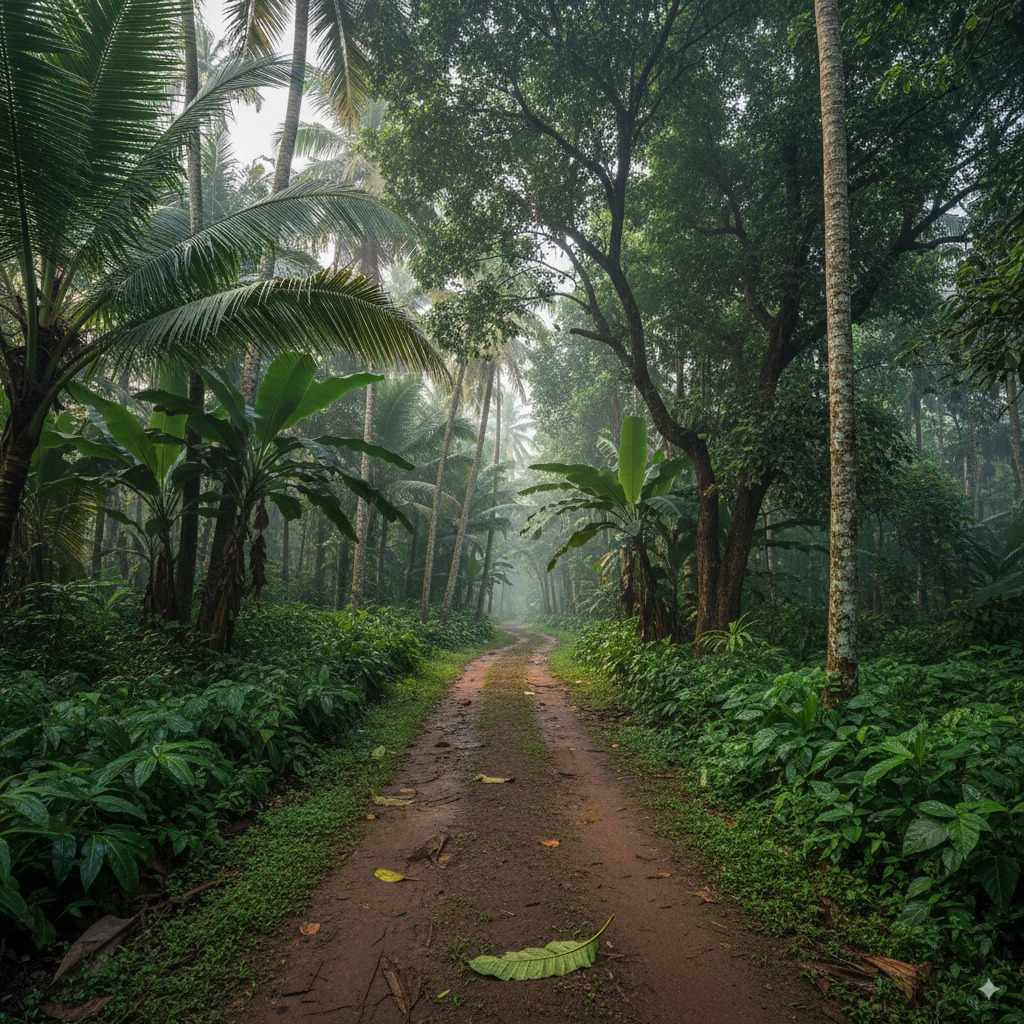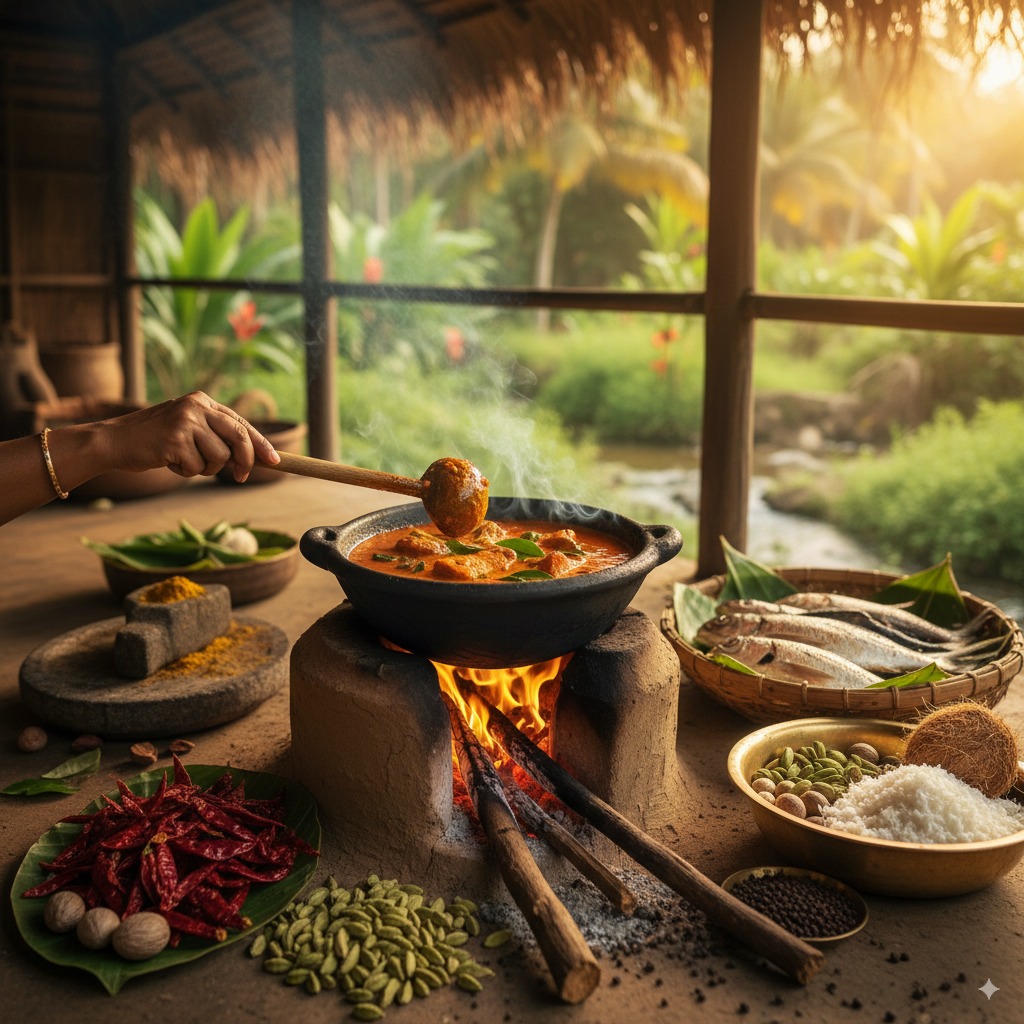Forget the Goa crowds. Instead, picture this: the hush of banana leaves at dawn, the earthy aroma of spice-infused coastal air, and the gentle gurgle of a natural stream just outside your cottage. Welcome to Parule and Bhogwe, a lesser-known coastal sanctuary tucked away in Maharashtra’s pristine Konkan Coast.
While most travelers rush toward the bustling beaches of Goa, those seeking authentic, soul-stirring experiences are discovering the magic of this quiet corner. Here, traditional Konkani architecture meets sustainable living, and the rhythm of village life flows as naturally as the monsoon streams that wind through tropical plantations.
At the heart of this experience lies Maachli Farmstay, where hosts Pravin and Priya Samant have created something truly special. Their eco-friendly cottages sit nestled among nutmeg trees and betel nut palms, offering travelers a chance to disconnect from the digital world and reconnect with nature’s gentle pace. Each morning begins with the symphony of native birds, guided by local expert Prathamesh, while evenings unfold with spectacular sunsets over untouched beaches.
This isn’t just accommodation—it’s an immersion into the authentic Konkan lifestyle. From cooking traditional Malvani cuisine on wood-fired stoves to learning village pottery techniques passed down through generations, every moment here tells a story of Maharashtra’s rich cultural heritage. The nearby Bhogwe Beach remains blissfully uncrowded, its golden sands perfect for those seeking solitude and serenity.
Whether you’re planning a romantic getaway, a family retreat, or a solo journey of self-discovery, Parule and Bhogwe offer something increasingly rare in our connected world: genuine peace and authentic cultural exchange.

What Makes Maachli Farmstay a Uniquely Authentic Experience?
Heritage-Inspired Architecture: The Soul of a “Maachli”
The word “Maachli” comes from the traditional Konkani term for the simple, functional huts that farming families have called home for centuries. But don’t let the word “simple” fool you—these structures represent generations of architectural wisdom perfectly adapted to the coastal climate.
Each cottage at Maachli Farmstay reflects this heritage through its thoughtful design. Built with locally sourced materials including bamboo, coconut palm thatch, and laterite stone, these eco-huts demonstrate the brilliance of traditional engineering. The elevated platform design keeps the living space cool and dry during monsoons, while the ingenious cross-ventilation system creates natural air conditioning that outperforms any mechanical system.
To help you visualize it, imagine a layout designed for connection with nature: wide verandas that blur the line between indoor and outdoor living, large windows positioned to capture cooling breezes from multiple directions, and a central living area that stays naturally comfortable even during Maharashtra’s warmest months. The traditional sloped roof, crafted from coconut palm leaves, provides excellent insulation while creating that distinctive rustic charm that makes each cottage feel like a piece of living history.
What truly sets these accommodations apart is their integration with the surrounding landscape. Rather than clearing land to build, the cottages are positioned to preserve existing trees, creating intimate courtyards where guests can enjoy morning coffee under centuries-old mango trees or afternoon tea beside fragrant frangipani bushes.

The Tropical Plantation Ambience: A Living, Breathing Ecosystem
Step outside your cottage, and you’ll find yourself in what feels like a carefully curated botanical garden—except this isn’t curated at all. This is simply how the Konkan region naturally flourishes when left to thrive.
The farmstay sits within a working tropical spice plantation where nutmeg, black pepper, and cardamom grow alongside traditional medicinal plants that have been treasured by local communities for generations. Walk the winding paths, and you’ll encounter Sarpagandha, known locally for its calming properties, and Shatawari, a herb celebrated in Ayurvedic traditions for its rejuvenating qualities. The aromatic Black Umbar trees provide shade while their leaves are used in traditional cooking, and the Satwin plants add their own distinctive fragrance to the coastal air.
A Sensory Walk Through the Plantation:
- Sight: Layers of green in every shade, from the deep emerald of betel nut palms to the silvery shimmer of coconut fronds dancing in ocean breezes
- Sound: The constant music of flowing water from natural streams, punctuated by calls from kingfishers, bulbuls, and the occasional hornbill
- Smell: Rich, earthy undertones mixed with the sweet perfume of frangipani and the spicy notes of nutmeg and pepper
- Touch: Cool mist from the stream on warm afternoons, and the interesting textures of bark and leaves from plants you’ve likely never encountered
- Taste: Fresh coconut water straight from the source, and the opportunity to sample fruits and herbs directly from their plants
The natural stream that runs through the property isn’t just scenic—it’s a lifeline that supports this entire ecosystem. During monsoon season, its gentle flow becomes more robust, creating natural pools perfect for a refreshing dip. Year-round, it provides the consistent moisture that keeps the medicinal herbs and spice plants thriving.

Farm-to-Table Malvani Cuisine: A Taste of the Real Konkan
When Priya Samant fires up the traditional wood-burning stove each morning, she’s not just preparing breakfast—she’s continuing a culinary tradition that has nourished coastal families for centuries. This is Malvani cuisine in its purest form, where every ingredient tells a story of the land and sea.
The magic begins with the spice blends, many of which are prepared fresh on the property. The famous Malvani masala combines dried red chilies, coriander seeds, cumin, and coconut in proportions that vary slightly from family to family, creating each cook’s signature flavor profile. When these spices meet fresh ingredients—vegetables from the kitchen garden, fish from local fishermen, and coconut milk extracted fresh each morning—the results are extraordinary.

Signature dishes you’ll encounter include the robust Sol Kadhi, a pink-hued drink made from kokum and coconut milk that perfectly balances the heat of spicy curries. The Valichi Bhaji showcases the versatility of simple beans transformed through traditional cooking techniques, while the Koliwada fish preparation demonstrates how coastal communities have perfected the art of highlighting seafood’s natural flavors.
Priya’s Famous Coconut Fish Curry Recipe Serves 4-6 people
Ingredients:
- 500g fresh kingfish or pomfret, cut into steaks
- 2 cups fresh coconut milk
- 2 tbsp Malvani masala paste
- 1 large onion, finely chopped
- 4-5 curry leaves
- 2 green chilies, slit
- 1 tbsp coconut oil
- Salt to taste
- Fresh coriander for garnish
Method:
- Heat coconut oil in a traditional clay pot (or heavy-bottomed pan)
- Add curry leaves and let them splutter
- Sauté onions until golden, then add Malvani masala
- Pour in coconut milk gradually, stirring to prevent curdling
- Add fish pieces and simmer for 10-12 minutes
- Garnish with fresh coriander and serve with steamed rice
What makes dining here special isn’t just the incredible flavors—it’s the complete experience. Meals are served on traditional plates made by local artisans, often on the veranda where you can watch the preparation process and learn about the cultural significance of different dishes.
Immersive Village Experiences: Beyond Just a Stay
Your guide Prathamesh doesn’t just show you around—he opens doors to experiences most travelers never discover. With an encyclopedic knowledge of local flora and fauna, he transforms simple walks into fascinating explorations of the Konkan ecosystem.
The morning bird walks are particularly special. “Plan for about two hours,” Prathamesh suggests, “because once you start spotting the resident kingfishers and visiting migratory birds, time just disappears.” He knows exactly where to find the colorful Indian Roller during its courtship displays and can predict when the White-bellied Sea Eagle will make its evening rounds along the coastline.
Village pottery sessions offer hands-on connection to traditions that stretch back centuries. Local artisan families welcome visitors into their workshops, where the spinning wheel is still operated by foot and the clay comes from nearby riverbanks. “Plan for about 1.5 hours for the pottery session,” notes Prathamesh, “but many guests find it so meditative they request extended sessions.”
The sunset hikes to Khavane and Nivati beaches are perhaps the most rewarding experiences. “Allow around 3 hours for the complete experience,” advises Prathamesh. The trail winds through cashew plantations and traditional villages where life moves at an unhurried pace. The reward is spectacular: pristine beaches with dramatic cliff formations, often with just you and the endless Arabian Sea as company.
One recent guest shared: “I’ve traveled extensively, but watching the sunset from Nivati cliff while listening to Prathamesh explain the local ecosystem was one of those moments that reminds you why you travel in the first place.”
Responsible & Community-Driven Tourism
Sustainability at Maachli Farmstay isn’t a marketing buzzword—it’s a way of life that benefits both visitors and the local community. Every aspect of the operation reflects careful consideration of environmental and social impact.
The eco-friendly practices are immediately visible: rainwater harvesting systems, solar power for basic electrical needs, composting of organic waste, and complete elimination of single-use plastics. But the deeper impact lies in how the farmstay supports the local economy.
We asked Pravin Samant what ‘sustainability’ means to him. His answer was simple: “It means leaving this land better than we found it for our children and our community. Every guest who stays here contributes directly to local families—from the woman who supplies our vegetables to the fisherman who brings fresh catch each morning.”
This community-driven approach creates authentic experiences while ensuring tourism benefits remain within the local area. The pottery classes support traditional artisan families, the guided nature walks employ local naturalists, and the farm-to-table dining showcases ingredients sourced from neighboring small farmers.
The farmstay also serves as an educational center for sustainable practices. Guests learn about medicinal plants, traditional farming techniques, and conservation efforts that protect the region’s biodiversity. Many visitors leave inspired to implement similar eco-friendly practices in their own lives.
Your Trip to Parule and Bhogwe: Practical Planning
Best Seasons & Travel Logistics
Each season brings its own magic to Parule and Bhogwe, making this destination appealing year-round for different types of experiences.
Monsoon Season (June-September): The landscape transforms into a lush paradise during Maharashtra’s monsoon months. This is when the region reveals its most dramatic beauty—cascading waterfalls, emerald green landscapes, and the intoxicating fragrance of wet earth mixed with blooming flowers. The natural streams run full, creating perfect spots for refreshing dips. While outdoor activities may be limited during heavy rain periods, this is the ideal time for cozy cottage experiences, traditional cooking sessions, and watching the spectacular lightning displays over the Arabian Sea.
Winter Season (October-February): Perfect weather makes this the most popular time for outdoor enthusiasts. Temperatures remain comfortable throughout the day, ideal for beach activities, nature walks, and sunset hikes. The post-monsoon landscape retains much of its lush beauty while offering clear skies perfect for birdwatching and photography.
Summer Season (March-May): While warmer, the coastal location provides refreshing sea breezes that make this season quite pleasant. This is the best time for beach lovers who prefer quieter shores and don’t mind warmer temperatures. The traditional architecture of the eco-huts really shines during this season, keeping interiors naturally cool.
Getting There:
From Mumbai (350km, 6-7 hours by car):
- Take NH66 south through Ratnagiri district
- The coastal route offers stunning scenery but requires careful driving during monsoons
- Train option: Take Konkan Railway to Ratnagiri, then local transport (90 minutes) to the farmstay
From Pune (400km, 7-8 hours by car):
- Route via Satara and Ratnagiri offers better road conditions
- Break journey in Satara for traditional Maharashtrian meals
From Goa Airport (120km, 2.5 hours by car):
- The shortest route for air travelers
- Road conditions are generally good year-round
- Pre-arranged transfers available through the farmstay
Smart Packer’s Checklist for the Konkan Coast:
- Comfortable walking shoes for nature trails
- Quick-dry clothing and swimwear
- Rain gear during monsoon months
- Insect repellent (natural options preferred)
- Reusable water bottle (refill stations available)
- Camera with extra battery (limited charging options)
- Personal medications (nearest pharmacy is 30 minutes away)
- Light cotton clothing for coastal humidity
- Sunscreen and hat for beach activities
Sample Itineraries for Every Traveler
The Weekend Retreat (2 Days/3 Nights):
Day 1:
- Afternoon arrival and cottage check-in
- Welcome drink and farm orientation with Pravin
- Sunset walk through the spice plantation
- Traditional dinner on the veranda
Day 2:
- Early morning bird walk with Prathamesh
- Malvani cooking class with Priya
- Afternoon visit to Bhogwe Beach
- Village pottery session
- Farewell dinner featuring your own cooked dishes
Day 3:
- Sunrise photography session
- Departure after traditional breakfast
The Monsoon Escape (3 Days/4 Nights):
Day 1:
- Arrival during afternoon shower
- Hot tea and traditional snacks in cottage
- Evening rain watching from covered veranda
Day 2:
- Morning herb walk (between rain showers)
- Extended cooking class – learn preservation techniques
- Afternoon reading and relaxation
- Traditional board games with host family
Day 3:
- Waterfall visit (seasonal, guide-dependent)
- Indoor pottery session
- Story-telling session about local folklore
- Ayurvedic massage with locally sourced oils
Day 4:
- Final rain photography session
- Departure with monsoon memories
Why Choose Parule and Bhogwe Over Crowded Beach Destinations?
In an era where authentic travel experiences are becoming increasingly rare, Parule and Bhogwe offer something precious: genuine connection to place and people. While popular beach destinations focus on amenities and entertainment, this corner of Maharashtra focuses on experiences that feed the soul.
Maachli Farmstay vs. Typical Beach Resort:
| Aspect | Maachli Farmstay | Typical Beach Resort |
| Vibe | Calm & Cultural | Crowded & Commercial |
| Accommodation | Heritage-inspired eco-huts | Standard hotel rooms |
| Dining | Farm-to-table Malvani cuisine | Multi-cuisine buffets |
| Activities | Village immersion, nature walks | Water sports, entertainment shows |
| Environmental Impact | Sustainable & regenerative | High resource consumption |
| Cultural Connection | Deep local interaction | Surface-level experiences |
| Noise Level | Natural sounds only | Music, crowds, traffic |
| Learning Opportunities | Traditional skills, local ecology | Limited educational value |
The choice isn’t just about where to stay—it’s about what kind of traveler you want to be. At Parule and Bhogwe, you become part of a larger story about sustainable tourism, cultural preservation, and genuine human connection.
Here, you’ll find yourself naturally slowing down, becoming more observant, and appreciating simple pleasures that urban life often obscures. The absence of commercial distractions allows space for meaningful conversations, creative inspiration, and the kind of rest that actually restores rather than merely entertains.
Frequently Asked Questions
Booking & Logistics
How far in advance should I book Maachli Farmstay?
Due to limited cottages and growing popularity, booking 2-3 months in advance is recommended, especially for winter months and holiday periods. Monsoon season offers more flexibility with shorter notice bookings.
What is the best way to get around locally?
The farmstay provides bicycle rentals for nearby exploration. For longer distances, they can arrange local transportation. Most experiences are within walking distance or include transportation as part of guided activities.
On-Site Experience
Is there Wi-Fi and mobile connectivity at the farmstay?
Mobile connectivity can be spotty, with better reception from BSNL and Airtel networks. Limited Wi-Fi is available in common areas for emergencies. This digital detox is part of the authentic experience many guests appreciate.
Is the food very spicy?
Can they accommodate dietary restrictions?
Malvani cuisine has robust flavors but spice levels can be adjusted to guest preferences. Priya happily accommodates vegetarian, vegan, and other dietary requirements with advance notice. The focus on fresh, natural ingredients makes adaptation relatively easy.
Is it family and kid-friendly?
What activities are there for children? Absolutely family-friendly! Children love the nature walks, pottery sessions, and learning about tropical plants. The safe, natural environment provides excellent opportunities for outdoor play and environmental education. Special children’s cooking classes can be arranged.
Location & Safety
How far is Bhogwe beach from the farmstay?
Bhogwe Beach is approximately 15 minutes by bicycle or 5 minutes by local transport. Multiple beach access points offer variety in scenery and activities.
Are the beaches safe for swimming?
Local beaches are generally safe for swimming, but ocean conditions vary by season. Hosts provide current safety information and recommend best swimming spots. Always swim during daylight hours and inform hosts of beach plans.
What medical facilities are available nearby?
Basic medical supplies are available at the farmstay for minor issues. The nearest primary health center is 20 minutes away, with a district hospital in Ratnagiri (90 minutes). Guests with specific medical needs should bring necessary medications.
Is the farmstay suitable for elderly guests?
The property is designed to be accessible, though some nature walks involve uneven terrain. Cottage access is easy, and many activities can be adapted for different mobility levels. Hosts work individually with elderly guests to ensure comfortable experiences.
About the Author
Sam Blake is a sustainable travel writer who has spent over a decade exploring India’s hidden corners, focusing on community-based tourism and authentic cultural experiences. This article is based on extensive on-site research and conversations with local hosts to provide the most comprehensive and authentic guide possible. He believes in travel that enriches both visitors and host communities while protecting the natural and cultural heritage that makes each destination unique.
References and Further Information
For official bookings and detailed information, visit the Maachli Farmstay website through xploreheaven.com
To explore more of the region’s offerings, consult the official Maharashtra Tourism website for additional attractions and travel information.
Learn more about the Konkan region’s unique flora and traditional medicinal plants through the Botanical Survey of India’s regional documentation.
For sustainable travel tips and responsible tourism practices in India, refer to resources from the India Responsible Tourism Society.
Last updated: September 2025
Read More Articles:
- Tinajani Canyon Peru: Ultimate Travel Guide to the Valley of Stone Giants, Elevation, Trails & FAQs
- Isla Suasi: The Complete Guide to Peru’s Private Lake Titicaca Island
- Ikara-Flinders Ranges — Complete Travel Guide for 2026
- Phillip Island, Victoria: Ultimate Travel Guide (Wildlife, Best Time to Visit & Insider Tips)
- Things to Do in Port Stephens – Best Attractions, Itineraries & Insider Tips

Nice read, I just passed this onto a friend who was doing a little research on that. And he actually bought me lunch because I found it for him smile Therefore let me rephrase that: Thank you for lunch! "Curiosity will conquer fear even more than bravery will." by James Stephens.
Solid arguments